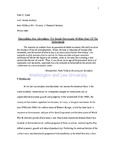Discrediting Neo-Liberalism: The Social Democratic Welfare State Of The Netherlands

View/
Author
Cook, Peter C.
Subject
Washington and Lee University, Shepherd Poverty Program
Poverty
Neoliberalism
Socialism
Health insurance
Medicaid
Medically uninsured persons -- Government policy
Netherlands
United States
Metadata
Show full item recordDescription
Peter C. Cook is a member of the Class of 2002 of Washington and Lee University. Capstone; [FULL-TEXT FREELY AVAILABLE ONLINE] This essay explores how the welfare state has managed to prosper in spite of conventional economic "wisdom". Unlike the United States, which has followed neo-liberal economic policies at the expense of the highest rates of poverty in the industrialized world, European welfare states have guaranteed a generous social safety net without sacrificing economic growth. For my example, I will look specifically at The Netherlands, whose welfare state closely exemplifies the social democratic welfare regime, as defined by Gøsta Esping-Anderson in his book, The Three Worlds of Welfare Capitalism. I will begin by defining what exactly a "social democratic welfare regime" is, and will summarize the components and entitlements of the welfare regime in The Netherlands. Next, I will outline neo-liberalism's criticism of the social democratic welfare state and provide a summary of the programs in the liberal welfare regime of the United States. I will then examine the benefits and drawbacks both of The Netherlands' system and the United States' system in terms of poverty reduction and promoting social equality. This will be followed by a comparative analysis of the economic progress of both countries to determine whether the welfare state of The Netherlands has hindered economic growth. Finally, I will look at the adjustments that The Netherlands has had to make in its social welfare program since the 1980's and the prospects for its future viability. I will conclude that the social democratic regime, as exemplified by The Netherlands, is the best possible system for ensuring the welfare of all of its citizens. [From Introduction]